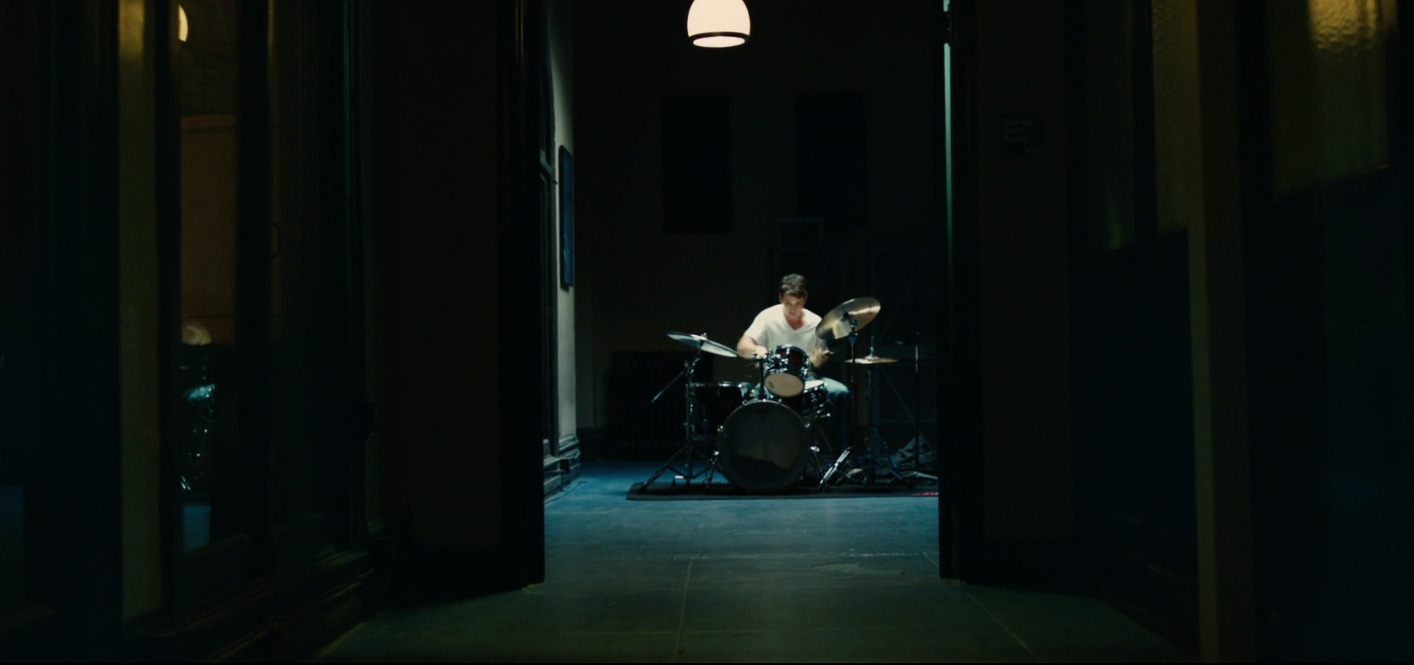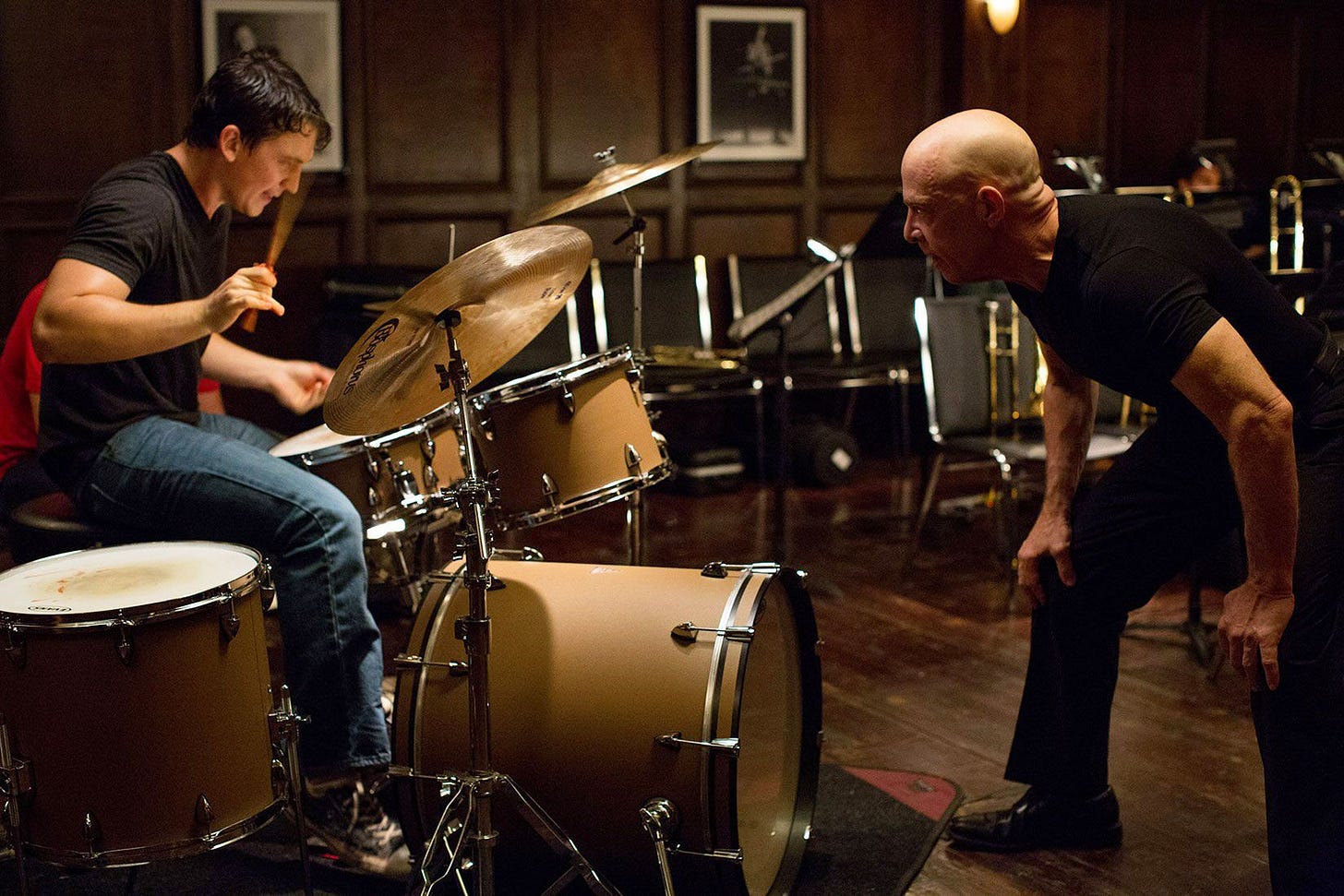Today I will be reviewing one of Dom’s personal favorite movies, which he has graciously allowed me to review… Damian Chazelle’s Academy Award-winning Whiplash. However, this movie is so unashamedly fantastic that I think it a waste to simply to “review” it; instead I will use a somewhat tenuous personal link with the world of the film as a whole and attempt to synthesize my ideas into what I think a Christian viewer can glean from the story. Because I have decided to go into more detail than you typically see on St. Luke’s Sketchbook, this review will be written and published in two parts! The second part will be released tomorrow.
When Dom brought this movie to our little movie-watching group in college I was surprised and excited. First, it had J. K. Simmons, and as a HUGE fan of the Sam Raimi Spider-Man films, that is always a plus (it’s a story for another day, but I got to visit the set of Spider-Man 3 when I was a kid). Second, I love music. I love discussing it and its amazing impact on storytelling, emotion, and its own artistic merit. Third, one of my best childhood friends is a professional violinist and has a B.A. and M.A. from the Juilliard School in New York. I know from him how much hard work, willpower, and level of crazy you need to have to rise to that top level of musicianship. This film promised a look into that world so I was thrilled.
As we watched, I got the amazing story, I got the superb music, I got the masterful character work, I got the stellar world-building, and I most certainly got my fill of the crazy. The craziest thing about the crazy in this movie… it is 100% believable. The tales I have heard from Juilliard really do validate the story in my eyes and I think that is one of the best parts about the film. I NEVER have to break the immersion. I never have to say, “there’s no way this would happen!” But enough about my personal experience with the film - let me catch you up to speed with a quick plot summary. (SPOILERS!)
Whiplash tells the story of student Andrew Neiman (Miles Teller) and his journey through Shaffer Conservatory. His talent and ambition as a jazz drummer catch the eye of professor Terence Fletcher (J.K. Simmons), and Andrew is scouted into Fletcher’s band. We then follow Andrew as Fletcher pushes him to his absolute limits as a musician. Fletcher stops at nothing to get perfection from his students. He hurls insults and physical objects alike at his students with a savagery you might not expect in a movie about a jazz drummer. He turns student against student and kicks them out if even the slightest mistake is made. We watch as Andrew drops everything in his life but his drumming. Fletcher turns him into a bitter and vindictive shadow of the hopeful student at the beginning of the film. He abandons his dorm room, his family, his friends in his quest to gain Fletcher’s approval. Eventually, Andrew breaks. He joins a lawsuit that results in Fletcher being fired and he abandons his dreams to be a professional drummer. We then watch Andrew find new purpose in his life. He rebuilds relationships, gets a normal job (something earlier in the film he scoffed at), and looks like he is slowly becoming happy. Second act, fin.
Here is where I want to stop my plot synopsis, get into character analysis, and put some cursory thoughts together. After that I’ll go over the third act plot in more detail, as well as how the character arcs are finished, and what we can learn from it.
The film is mainly an interplay between two personalities, Andrew and Fletcher. I think that, like in many amazing films, their dynamics can be best shown in just a few scenes and a few moments. To best understand these two characters we need to look at three scenes: the introduction to the characters, Andrew’s first class with Fletcher, and when Andrew is replaced.
The first scene opens on a long camera push in down a dark hallway, intense drum practice becoming louder and louder. Next shot we reveal Andrew as the drummer. He is in the zone, when he’s suddenly interrupted by who we will soon learn is Fletcher. The following exchange takes place:
FLETCHER
What's your name?
ANDREW
Andrew Neiman, sir.
FLETCHER
What year are you?
ANDREW
I'm a first-year, sir.
FLETCHER
You know who I am?
ANDREW
Yes...
FLETCHER
You know what I do?
ANDREW
Yes...
FLETCHER
So you know I'm looking for players.
ANDREW
Yes...
FLETCHER
Then why did you stop playing?
(Beat. Andrew nods, smiles. He gets it. Summons up all his
remaining energy and resumes playing, trying to really show
off this time. Rolls, fills, speedy stick-work. He finishes.)
FLETCHER (CONT'D)
Did I say to start playing again?
(Andrew looks at him.)
ANDREW
I thought—
(then, blanching,)
I'm sorry, I misun—
FLETCHER
I asked you why you stopped playing. Your
version of an answer was to turn into a
wind-up drummer monkey.
ANDREW
I'm sorry — I—I stopped playing becau—
FLETCHER
Show me your rudiments. This introduces the power dynamic between Fletcher and Andrew. Fletcher catches you off guard, makes a fool of you, demands something from you, then leaves. He does this over the course of the film. Andrew ends up kicking himself for this interaction: his whole purpose for joining this college was to get into Fletcher’s band, and he thinks he’s blown it. He pushes himself to fix his mistakes in front of Fletcher, and later on is rewarded with an invitation to be second chair for the band. We later learn that this is intentional, part of Fletcher’s method. Fletcher presents Andrew with his first stumbling block. Andrew could have thought, “I’ve failed, I’ll never get in now, I’ve made too big a fool of myself,” and given up. But instead he rises to the occasion and Fletcher recognizes it.
Next, the second scene I want to look at, Andrew’s first class with Fletcher. This scene is a masterpiece! Hands down one of the most memorable and intense things you will watch. We start with another test from Fletcher. Andrew arrives for practice at 6 a.m. and waits a solid 3 hours for the next people to show up. Test passed! We get a first glimpse at Fletcher’s impact on other students here. He steps in the door and at once, complete silence. Every student looks at the floor. Everyone is on edge. Fast forward a bit and we’ve seen a student kicked out of the class. Intimidating. Fletcher calls for a break and pulls Andrew aside. He gives some encouraging words.
FLETCHER
(walking Andrew down the hall)
Listen, Andrew. I know what you saw in
there is worrying you, but there's a big
difference. This is your first day.
...
FLETCHER (CONT'D)
The key is — relax . Don't worry about
the numbers or what the other players
think. You're here for a reason. You
believe that, don't you?
(Andrew nods)
Say it.
ANDREW
I'm here for a reason.
FLETCHER
Good.
(A beat. And, finally--)
FLETCHER (CONT'D)
Now have fun.
He pats Andrew on the back — then promptly walks off. Back in class Andrew seems off to a good start. He’s doing well until he comes in late. Not. Fletcher’s. Tempo. Andrew starts again, late. Again. Late. Again. Early. Again. Late. On and on until Andrew has no more confidence in his own ability to count time, read music, play the drums, anything. Eventually Fletcher ends the session, saying, “Start practicing harder, Neiman.” Every other student is silent. It becomes clear that they have ALL been through this. Every one of them has been broken down by Fletcher and come out the other side somehow. Fletcher leaves you with two options, get better or leave. Here is where Andrew makes his decision, he decides to get better. At first you might think, “Heck yeah Andrew! Get better and show him who’s boss! SLAY!” like anyone supporting a good friend to achieve his dreams. But in this case you may want to think twice. Andrew is likely already practicing 6-8 hours of drumming a day. Throughout the film so far we have watched him grow as a person, develop a romantic relationship, spend some of his free time with family. Now, as Andrew pursues his path to musical perfection he abandons his burgeoning romantic relationship, cuts off his family that don’t understand him, and moves into a practice room. He completely and utterly belongs to his craft, and thus, to Fletcher.
The third scene. Andrew at this point has become first chair drummer in the band. He is growing comfortable with his new position in the band, something Fletcher recognizes. I say this because precisely at the point Andrew is becoming confident Fletcher shakes up his world once more. He brings in another drummer and gives him the chair. Andrew, quite obviously, is furious with this turn of events. But his anger gives way as he sees something quite familiar happening. This new drummer is getting the exact same treatment that Andrew received in his first class with the band. As Fletcher begins to lay into our new drummer we push into Andrew, and Andrew smiles.
Thank you for reading! Thus concludes part 1 of this review. Click here to read the second half!





